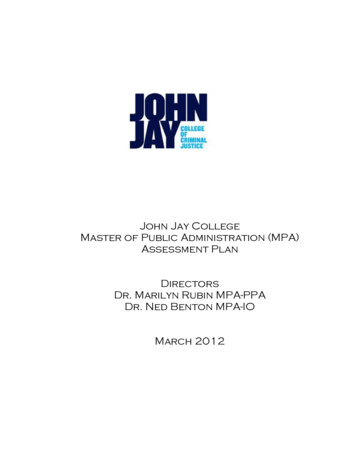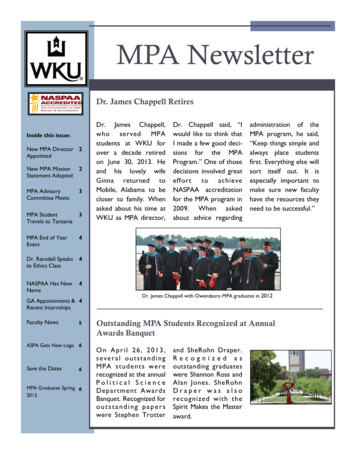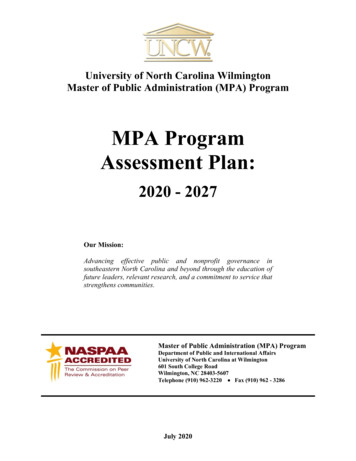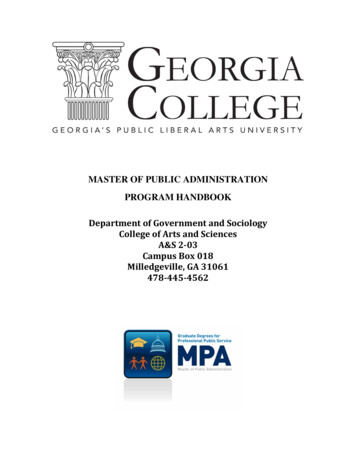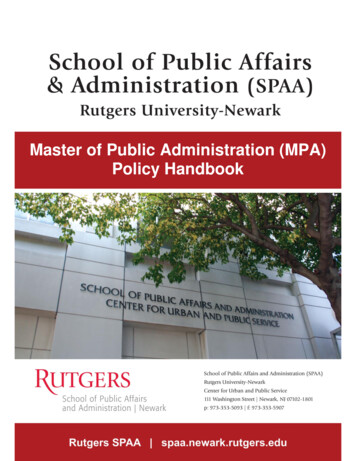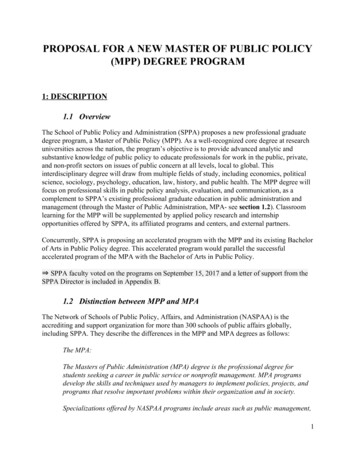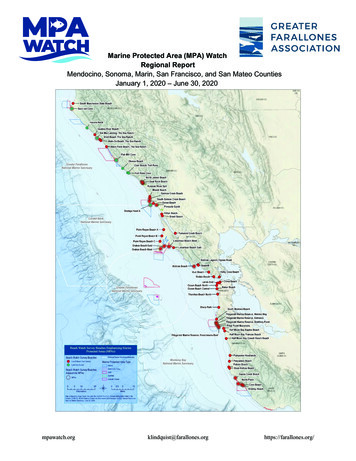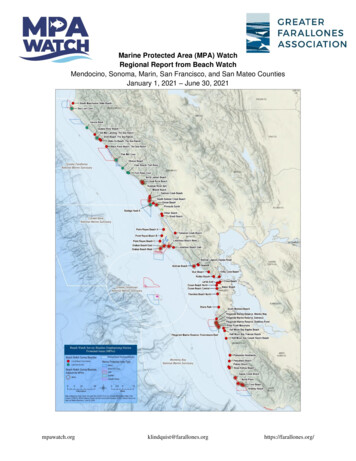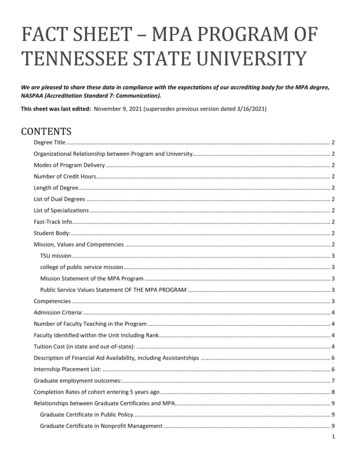
Transcription
FACT SHEET – MPA PROGRAM OFTENNESSEE STATE UNIVERSITYWe are pleased to share these data in compliance with the expectations of our accrediting body for the MPA degree,NASPAA (Accreditation Standard 7: Communication).This sheet was last edited: November 9, 2021 (supersedes previous version dated 3/16/2021)CONTENTSDegree Title . 2Organizational Relationship between Program and University . 2Modes of Program Delivery . 2Number of Credit Hours . 2Length of Degree . 2List of Dual Degrees . 2List of Specializations . 2Fast-Track Info. 2Student Body:. 2Mission, Values and Competencies . 2TSU mission . 3college of public service mission . 3Mission Statement of the MPA Program . 3Public Service Values Statement OF THE MPA PROGRAM . 3Competencies . 3Admission Criteria: . 4Number of Faculty Teaching in the Program . 4Faculty Identified within the Unit Including Rank . 4Tuition Cost (in state and out-of-state): . 4Description of Financial Aid Availability, including Assistantships . 6Internship Placement List: . 6Graduate employment outcomes: . 7Completion Rates of cohort entering 5 years ago . 8Relationships between Graduate Certificates and MPA. 9Graduate Certificate in Public Policy . 9Graduate Certificate in Nonprofit Management . 91
Graduate Certificate in Healthcare Administration and Planning . 9Graduate Certificate In Local Government Management . 9Graduate Certificate in PA Executive Leadership . 9Other special cases: TGMI or LEAD . 9DEGREE TITLE:Masters of Public AdministrationORGANIZATIONAL RELATIONSHIP BETWEEN PROGRAM AND UNIVERSITY:The MPA program is offered bythe Department of Public Administration, within the College of Public Service; its faculty are housed on the AvonWilliams Campus of Tennessee State University (downtown campus).MODES OF PROGRAM DELIVERY:We have one mode of program delivery: 100% online (program shifted to 100%online beginning Fall 2020); this is a permanent change, not a pandemic-related change. See the Graduate Catalog andthe MPA handbook for more details.NUMBER OF CREDIT HOURS: 36 hours of coursework (for in-service students with at least one year of professionalexperience in the public, nonprofit or healthcare sectors who successfully complete the internship waiver process andpaper) or 42 hours (36 hours of coursework as well as 6-hour internship; mandatory for pre-service students, optionalfor in-service students meeting the professional experience criterion but who desire to do the internship).LENGTH OF DEGREE:MPA students in our program proceed through the program at different paces depending ontheir employment status and preferences. A common pattern our students follow is 2 courses per semester, for a totalof six semesters for regular coursework (2 years), with another semester possible if the student is pre-service and mustcomplete the internship (or, they could pursue the internship during a semester in which they also take classes. Studentsshould be aware that course offerings are variable depending on enrollments and staffing, particularly in summer. Tominimize time to degree, it is essential that students seek official advising in their FIRST semester of the program, andEACH semester prior to registering during the duration of their studies.LIST OF DUAL DEGREES:None.LIST OF SPECIALIZATIONS:None. However, most students elect to also pursue the graduate certificate in publicpolicy, nonprofit management, local government management, public administration executive leadership, orhealthcare administration and planning. Those that do so take their three MPA electives in those respective areas.Choosing to seek a certificate as well as the MPA without seeking appropriate advising can affect time to degree. Moredetail on the relationship between our graduate certificates and the MPA curriculum is provided at the end of this FactSheet; questions may be directed to the Department Chair Dr. Rodney Stanley at rstanley1@tnstate.edu.FAST-TRACK INFO:None.STUDENT BODY:Forty-eight (48) students admitted to the MPA program were taking classes in Fall 2020. Twentynine percent (29.2%) were male, 91% were part-time students, and the average student age was 35. Forty-three percent(43.8%) were African American Non-Hispanic, 35.4% were White Non-Hispanic, 0.2% were of other race(s)/ethnicities,and 16.7% were of unknown race/ethnicity. (based on data from TSU Institutional Research Office, received 2/2021).MISSION, VALUES AND COMPETENCIES: (this MPA program mission and values adopted May 2018; programcompetencies have been in place since 2010 though the associated detailed student learning outcomes weresubstantially updated in Spring 2018)The MPA mission and public service values statement are also available online.2
TSU MISSIONTennessee State University, through its legacy as an HBCU and land grant institution, transforms lives, prepares adiverse population of leaders, and contributes to economic and community development by providing affordableand accessible educational programs at various degree levels promoting academic excellence through scholarlyinquiry, teaching, research, lifelong learning, and public service.COLLEGE OF PUBLIC SERVICE MISSIONOur mission is to educate, socialize and serve students and employers of nonprofit, healthcare and urbanorganizations by: [think] providing educational programs that build skills in knowledge of social work, urban affairs,public administration, and leadership; [work] conducting scholarly and applied research activities supportive ofthese educational purposes; and [serve] consulting and applying research and knowledge of social programs.MISSION STATEMENT OF THE MPA PROGRAMDepartment of Public Administration, College of Public Service, Tennessee State UniversityOur MPA program prepares students, as ethical public and nonprofit managers and leaders, to respond equitably,effectively, and efficiently to the needs of a diverse society. We recognize the goals of our students working in, orpreparing for, public service by emphasizing flexibility and quality in teaching and learning. We teach the coreconcepts of public administration with a focus on practical application, while strengthening students’ ability to solveproblems analytically. Students may build specialized skills on one of the program’s areas of expertise: public policy,leadership, nonprofit management, local government management, or healthcare administration and planning. Asinstructors and advisors, we work closely with students to support both their classroom and career achievement; inreturn, students are expected to pursue academic excellence and demonstrate integrity. As scholars, we engage inresearch and service to the University, community, and profession. By building relationships with public andnonprofit organizations in Middle Tennessee and beyond, we enhance our ability to develop students asprofessionals.PUBLIC SERVICE VALUES STATEMENT OF THE MPA PROGRAMThe guiding public service values of the MPA program are: EQUITY – Public servants should practice impartiality and fairness in their daily work, while balancing that pursuitwith the need for effectiveness and efficiency.EFFECTIVENESS – Public servants should work in a proficient and productive manner towards the common good,setting transparent performance outcomes to measure progress while balancing that pursuit with the need for equityand efficiency.EFFICIENCY – Public servants should be careful and innovative stewards who seek to create the most public value outof scarce resources, while balancing that pursuit with the need for effectiveness and equity.DIVERSITY – Public servants should understand, value, and respect both individual differences and commonalities,working to create and maintain inclusive organizations and communities.COMPETENCIESMPA graduates in our program are expected to achieve the following five overarching Program Competencies (PCs),consistent with our mission and based upon the standards of our accrediting organization, NASPAA:1. Each MPA graduate will be competent to lead and manage in public, nonprofit, or public affairs governance.3
2. Each MPA graduate will be competent to participate in and contribute to the policy process.3. Each MPA graduate will be competent to analyze, synthesize, think critically, solve problems, and make decisionsappropriate to public and nonprofit administration settings.4. Each MPA graduate will be competent to articulate and apply a public service perspective.5. Each MPA graduate will be competent to communicate and interact productively with a diverse and changingworkplace and citizenry.A set of more detailed student learning outcomes (SLOs) are associated with each of the five PCs above. Tounderstand what specific skills, abilities and knowledge areas are included in the MPA degree at TSU, review ourcompetency and learning outcomes by course (this most recent version of our student learning outcomes andcourse mapping was adopted by program faculty in March 2018).ADMISSION CRITERIA:See the current Graduate Catalog for admission criteria to the Graduate School at TennesseeState University (catalog front matter) and to the MPA degree in particular (in the College of Public Service section). Thecurrent MPA admissions policy as of the 2021-2023 TSU Graduate Catalog is summarized here: Requirements are (1)Graduate School Application; (2) application fee; (3) undergrad GPA of 2.7 or higher; (5) three recommendation lettersfrom persons familiar with the applicant’s potential for masters-level study in public administration (may be fromacademic personnel, professional supervisors/colleagues, or a mix); and (6) Statement of Purpose in seeking the MPAdegree. Applicants with undergraduate GPAs between 2.5 and 2.69 may be considered for admission based onsuccessful completion of a Graduate Certificate with the Department of Public Administration (with a certificate GPA of3.0 or above). The courses from the certificate count towards your MPA once admitted to the degree program. Financialaid is available for our certificate programs if all University and Federal requirements for eligibility are met andmaintained by students, just like a degree. Applicants must be eligible to take a fully-online degree offered by aTennessee institution. Additional requirements apply by TSU Graduate School policy, as detailed in the front matter ofthe Graduate Catalog. This overview does not replace the more detailed policies contained in the Graduate Catalog.NUMBER OF FACULTY TEACHING IN THE PROGRAM:Six full-time faculty taught 50 percent or more of theirteaching load in the MPA program in 2020-2021. 96 percent of all MPA courses were taught by full-time programfaculty. 97% percent of all MPA required (“core”) courses were taught by full-time program faculty. All part-time(“adjunct”) faculty are qualified both by holding the doctorate in public administration and by extensive professionalexperience in the public or nonprofit sectors.FACULTY IDENTIFIED WITHIN THE UNIT INCLUDING RANK:Please see our Faculty Directory online.TUITION COST (IN STATE AND OUT-OF-STATE):Updated tuition and fee costs are published online by the TSUBursar for in-state and out-of-state graduate students. The MPA became a 100% online program in Fall 2020. Studentswith out-of-state residency who only register for online courses at TSU are eligible for the “eRate,” which is lower thanstandard out-of-state tuition if all conditions are me. Visit the Bursar’s website for details. A sample total tuitionestimate follows, but this would be affected by variation in student course-taking patterns and actual fee changes overtime.[FACTSHEET CONTINUES ON NEXT PAGE]4
Per credit hour,Fall 2020/Spring 2021 ratesMPA degreeMPA degreeIn-service,no internship required;attend full-time with estimatedannual increasePre-service,6-credit internship required,attend full-time withestimated annual increase3642credits hours to degree22years to complete degree (if attend full time)10%10%estimated annual tuition increase for Year 2 523 19,769 23,064IN-STATE* 749 28,312 33,031OUT-OF-STATE eRATE***2020-2021 IN-STATE tuition and fees per 021 OUT-OF-STATE eRATE tuition and fees per Rate%20Graduate.pdfStudents may choose to attend part-time which could expose them to more annual tuition changes. For simplicity,this estimate does not take into account leveling-off of program service fee (one component of total tuition andfees) if more than 8 credits taken in a single semester for in-state. See Bursar fee sheet for full details.Assumptions: 2020-2021 fees are per the Bursar’s fee site as of 2/12/2021. The calculations shown above assume the student attends full-time and completesthe program in two years. The TSU Bursar recommends estimating tuition increases at 5-10% per year; the higher estimate of 10% is used here for the secondyear of study. These values do not include textbooks which are necessary for graduate education. Please see this notice about textbooks for more information.These figures and estimates are provided for informational purposes; current official rates and fees are published and broken out in more detail at the Bursar’ssite.Overall credit requirements: Students with no professional public or nonprofit sector experience are required to complete a 6-credit internship yielding a totalMPA credit requirement of 42. Those with at least one year of professional-level public or nonprofit sector experience may have the internship requirementwaived by the advisor, for a total MPA credit requirement of 36, with successful documentation of work experience and relationship to MPA content. Also,students choose to take varying amounts of courses per semester, which affects time to degree and the number of annual changes in tuition rates which mayapply.Financial assistance: Graduate assistantships may be available on a competitive basis for the MPA degree; please see this FAQ on financial assistance for moreinformation. Tennessee state government employees may have access to state tuition waivers which cover the cost of one course per semester. Ask your HRoffice about applicability of the waiver or other employer support for graduate study. [FACTSHEET CONTINUES ON NEXT PAGE]5
DESCRIPTION OF FINANCIAL AID AVAILABILITY, INCLUDING ASSISTANTSHIPS:Financial aid information forgraduate students is available from the TSU Financial Aid site. A limited number of Fall/Spring graduate assistantshipsinvolving a 20-hour per week work commitment may be available for qualifying MPA students; this is a selective processand only individuals who have been unconditionally admitted to the MPA may apply. The application form is linked onthe MPA handbook page in the area for prospective students. Information on various scholarship possibilities is offeredon the CPS site.INTERNSHIP PLACEMENT LIST:Below are recent placement types and locations for MPA interns in our program; asix-credit internship is required of “pre-service” students who do not yet have one or more years of professional-levelpublic, nonprofit, or healthcare administration work experience.Most students in our program do already have this level of experience and are therefore considered “in-service.” Inservice students may apply for a waiver of the internship requirement, a process discussed with the advisor. If theexperience is judged appropriate by the advisor, the student must submit the internship exemption application whichincludes documentation of the positions held, job tasks, and relationship of MPA core and elective course content to theprofessional experience. This documentation must be approved by the advisor for the waiver to be granted.As most of our students are in-service, in a typical academic year there are 0 to 2 MPA students who are pre-servicecompleting internships. For more internship locations including older data, plus organization links, visit the MPAinternship onprofitLocalLocalNonprofitLocalState / Higher EducationNonprofitHealthcare / NonprofitStateNonprofitInternship LocationCity of Tullahoma, TN (2021 graduate)TN Department of Transportation (2019 graduate)US Equal Employment Opportunity Commission, Nashville Office (2019 graduate)TN County Technical Assistance Service (2018 graduate)Tennessee Advisory Commission on Intergovernmental Affairs (2015 and 2018 graduates)Lawyers’ Committee for Civil Rights Under Law (DC; 2017 graduate)Nashville Area Chamber of Commerce (2017 graduate)City of Duluth, GA (2016 graduate)Metro Nashville Police Department (2015 graduate)Blood:Water (2015 graduate)City of Spring Hill, TN (2015 graduate)University of Memphis Office of Governmental Relations (2014 graduate)National Women’s Survivor Convention (2013 graduate)The Good Shepherd Residential Services, Nashville (2013 graduate)Tennessee Legislative Internship (multiple recent graduates)Nashville International Center for Empowerment (multiple recent graduates)[FACTSHEET CONTINUES ON NEXT PAGE]6
GRADUATE EMPLOYMENT OUTCOMES:Data on MPA employment outcomes for all alumni with knownemployment status are available on the MPA program page. Recent alumni employment known as of 3/16/2021 isshown below (also posted on the program page).[FACTSHEET CONTINUES ON NEXT PAGE]7
COMPLETION RATES OF COHORT ENTERING 5 YEARS AGO [these data are updated in Fall each year]:NOTE – In general, completion time depends onthe number of courses students choose to take per semester: for example, to finish within six semesters, students must choose to take full course loads eachsemester. It may also depend on whether a student was required to do the internship based on professional experience. Most students in the program choosenot to take a full graduate course load (3 courses per semester) due to work obligations, and some choose to only take 1 course per semester due to thestructure of tuition support from their employer.5-year Cohort all students enrolling for the first time in MPA program in 2016-2017 – all unconditionally admittedCohort graduation rate, across conditional and unconditional admits 70% (7 graduates out of 10 enrolled admits)For details on the speed of graduation, see table below.10Percent of cohort100%7222170%20%20%20%10%00%Number of studentsCOHORT: students enrolling in MPA for first time in academic year 2016-2017 (admitted in calendar year 2016)Total cohort members graduated with MPA by 10/25/2021Graduated within 6 semestersGraduated within 7-9 semestersGraduated within 10-12 semestersGraduated in more than 12 semesters *Cohort member(s) still taking courses or completing final program requirements as of 10/25/20213Cohort member(s) who stopped taking courses without completing the MPA degree *** This student chose to take 1 course per semester throughout their studies due to the structure of tuition support from their employer.** Of the 3 cohort members who left program or became inactive, 2 became inactive with GPA 3.0 or another type of hold; 1 left for personal/relocation/job reasons.30%[FACTSHEET CONTINUES ON NEXT PAGE]8
RELATIONSHIPS BETWEEN GRADUATE CERTIFICATES AND MPAMost students who are admitted to the MPA also choose to complete a six-course graduate certificate, which will thendictate the three electives taken in the MPA. The certificates are “stacked” with the MPA curriculum, so those whodesire to complete a certificate prior to deciding to seek the MPA may also do so and bring their certificate courseworkwith them into the MPA. The certificate can also serve as a bridge to the MPA as follows: the MPA requires anundergraduate GPA of 2.7 or above. However, students with an undergraduate GPA between 2.5 and 2.69 whocomplete all six courses required for a graduate certificate in the TSU Department of Public Administration with acertificate GPA of 3.0 or better may be considered for unconditional admission to the MPA degree, without meeting the2.7 undergraduate GPA requirement. Students must still meet the other admission requirements of the MPA, andadmission cannot take place until after the six courses are showing on the transcript and the GPA threshold is met.The way in which the curricula of the certificates are stacked with that of the MPA is detailed below for each certificate.Note that credits used towards a different, completed graduate degree cannot be counted towards the MPA; but creditsearned in the course of a graduate certificate may. Students who completed a certificate in the past under a differentcurriculum may not be able to bring all courses into the MPA curriculum, they should consult the Department Chair fortheir situation.GRADUATE CERTIFICATE IN PUBLIC POLICY – (link) three courses are MPA core courses (6410, 6210, 6130); theother three courses count as the three MPA electives (6430, 6450, 6390). Therefore, all SIX certificate courses may becounted towards the MPA if a student has completed or is pursuing the Public Policy certificate concurrently.GRADUATE CERTIFICATE IN NONPROFIT MANAGEMENT – (link) three courses are MPA core courses (6210, 6130,6240); the other three courses count as the three MPA electives (6190, 6950, 6960). Therefore, all SIX certificatecourses may be counted towards the MPA if a student has completed or is pursuing the Nonprofit Managementcertificate concurrently.GRADUATE CERTIFICATE IN HEALTHCARE ADMINISTRATION AND PLANNING – (link) Three courses are requiredcore courses in the MPA (6110, 6130, 6210). The remaining courses may be counted as MPA electives (6190, 6515,6550). Therefore, all SIX certificate courses may be counted towards the MPA if a student has completed or is pursuingthe Healthcare Administration and Planning certificate concurrently.GRADUATE CERTIFICATE IN LOCAL GOVERNMENT MANAGEMENT – (link) Three courses are required core coursesin the MPA (6210, 6230, 6240). The remaining courses may be counted as MPA electives (6290, 6420, 6440). Therefore,all SIX certificate courses may be counted towards the MPA if a student has completed or is pursuing the LocalGovernment Management certificate concurrently.GRADUATE CERTIFICATE IN PA EXECUTIVE LEADERSHIP – (link) PADM 6240 and PADM 6310 are already MPA corecourses. With department chair permission, PADM 6270 Seminar in Administrative Leadership may be substituted forMPA core course PADM 6490 Politics of Administration. The other three certificate courses (PADM 6400, PADM 6420,and PADM 6260) may be used to fill the three elective slots in the MPA curriculum. Therefore, all SIX certificate coursesmay be counted towards the MPA if a student has completed, or is pursuing the Exec. Leadership certificateconcurrently. (Students may have taken PADM 6320 Org. Analysis instead of PADM 6310 Org. Theory under an earlierpattern; 6320 can be substituted for 6310)OTHER SPECIAL CASES: TGMI OR LEAD – TGMI and LEAD are TN state government special leadership curricula forwhich individuals are selected competitively. Individuals who successfully completed one or both of these programs atthe state will receive credit for a single course, PADM 6270 Administrative Leadership, that is required for the GraduateCertificate in PA Executive Leadership, and which may count towards the MPA curriculum with department chairpermission. The exact nature of the substitution depends on the student’s program and should be discussed with thedepartment chair. [END FACTSHEET]9
teaching load in the MPA program in 2020-2021. 96 percent of all MPA courses were taught by full -time program faculty. 97% percent of all MPA required ("core") courses were taught by full-time program faculty. All part-time ("adjunct") faculty are qualified both by holding the doctorate in public administration and by extensive .
